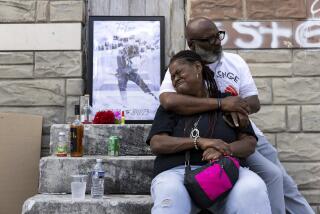Fearful Parents Face Reality of Violence
- Share via
At 62, Katheryn McFarland is well aware that you don’t have to be looking for trouble for trouble to find you, especially when your children are teenagers and you live in a high-crime neighborhood.
You adjust, she says. You demand that your 15-year-old be indoors by the time the street lights go on--even in summer. You buy computer games to encourage your children to play indoors. You constantly check on each child’s whereabouts and require them to phone in. There are only certain routes to go home, only certain people to associate with, and you drill them on these routines.
You accept the probability, seeming less and less distant each year, that something terrible could happen simply by venturing into a public space: a school, a park, a bus.
“I pray,” said McFarland, a retired florist and minister and the foster mother of three children ages 12 to 15. “I do a lot of praying.”
These are not just the realities faced by parents who live in communities like South-Central Los Angeles, where an armed gang member aiming at a rival opened fire at a crowded MTA bus Thursday, killing 17-year-old Corie Williams and wounding her 18-year-old classmate. Increasingly, this is becoming the gut-wrenching reality for parents throughout the city.
“It’s crazy, the world’s gone crazy,” McFarland said, alluding to the deaths of both Corie and entertainer Bill Cosby’s son, killed the same day in Bel-Air. “You feel like no one is safe anywhere.”
She feels like a prisoner in her house, metal bars covering windows and a metal front door protecting her from gang warfare and drugs--and even then she does not feel safe.
A few months ago, a stray bullet punctured one of the walls while the family was away.
“I’d like to move but where, where do I go?” said McFarland, who has been raising the children alone since her husband died two years ago.
The solution, she said, is to keep the children busy. Her oldest, Porchea, competes in track, is a member of the drill team and is active in the church. And yet here was McFarland on Friday, walking to Centennial High School in Compton--the same school Corie Williams attended--to pick up Porchea after a fight.
At the corner of Imperial Highway and Avalon Boulevard, where Corie Williams and her classmate were riding when they were shot, Tina Smith, 36, stood waiting on the same bus, MTA Route 53, talking about her concern for her 13-year-old son, who each day has to ride another bus home by himself.
“If I could, I would drive him everywhere, but I can’t. I don’t have a car,” she said. “I worry about his safety, but you can’t live your life worrying. He has to make it on his own, he has to live in this world.”
Donald Ray Allen, a 42-year-old martial arts instructor who lives in the Nickerson Gardens housing project in Watts, laments that many of the recreational programs he enjoyed as a child have vanished, in effect pushing children onto the streets.
“Children need places to go, things to do,” he said. “My daughters don’t have the programs that I had growing up.”
At a neighborhood laundry, Maria Pulido, a Cal State Long Beach student whose parents live in the area, said she moved away to escape gang violence.
“I return home, but my parents don’t let me come back late at night unless I’m with someone,” said Pulido, 19, who lives in a Long Beach apartment.
The key, said Burna Washington, a resident of the Jordan Downs housing project, is to get your children involved in sports. She also keeps her 18-year-old son busy with games--Monopoly and Nintendo.
“When I’m not there, I call and check,” she said.
How to keep her children occupied was on Katheryn McFarland’s mind Friday when she walked to Centennial High to pick up Porchea, who had been suspended for fighting the day before. Along the way, McFarland passed the television crews reporting on the bus shooting.
Porchea knew Corie Williams.
“I used to say hello to her in the halls,” she said as they walked back home on Central Avenue.
Porchea said she had gotten in a fight only to protect herself from a student who was trying to bully her.
“I never get into this kind of trouble,” she said. “I usually go straight home from school or to a tutoring program. I do my homework, watch television. I don’t stay on the street.”
On weekends, she goes to the movies and church with her family.
The school counselor told Porchea she should have walked away from the bully.
McFarland told her daughter she didn’t support her decision to fight. But she told her she recognized that there are times when you are not safe even if you walk away. Trouble finds you.
More to Read
Sign up for Essential California
The most important California stories and recommendations in your inbox every morning.
You may occasionally receive promotional content from the Los Angeles Times.










